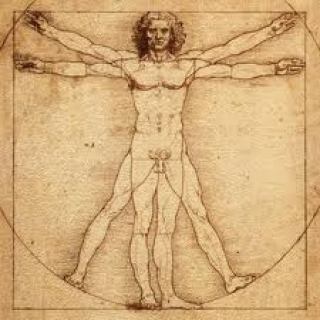 |
| Davinci Viewed Man Through A Greek Lens |
How should we think about ourselvses? The ancient Greeks believed that man was the measure of all things. But the Hebrew mindset believed that God was the measure of all things. There is a massive, unbridgeable gap between these two worldviews.
The contemporary world view is Greek. It exhorts us to love, esteem, honor, and exalt humanity. Why? We are wonderful. Christians, influenced by this worldview reason, “don’t you know that you are made in God’s image and likeness?” The problem is not that this is false. It is that they stop here.
The biblical view of self is more nuanced. It presents us with two contrasting ideas that must always be held in tension.
First, God made man in his image and likeness. We are the crown of God’s creation. This means that, contrary to the views of PETA, people are not just another species. We are infinitely more important than other animal species.
However, on the other hand, because we are sinners, the Bible also describes us with numerous belittleing terms . For example, Isaiah 41:14 and Job 25:4-6 refert to us as worms. Yup. That’s right. Those slimy, finger length insectoids that thrive in our lawns. In fact, when Jesus took our sin upon himself he stooped and referred to himself as a “worm and not a man” (Ps. 22:6).
In addition, Psalm 62:9 refers to mankind as a “breath…lighter than a delusion,” Ps 78:39 a “wind that passes by and does not return,” Psalm 39:6 a “shadow,” Psalm 73:20 a dream that one soon forgets upon awakening, and Psalm 92:5-6 grass that renews in the morning but has withered by evening. With all of this in mind David asks, “What is man that you would you are mindful of him and the son of man that you care for him” (Ps 8:4)?
How do we assimilate these contrasting ideas? First, of all we are creatures, but although creatures we are unique because God made us in his “image and likeness.” God has given us value that the animals do not share. God values people in a unique way.
But second, sin has deformed us. It has tarnished the “image and likeness.” It has twisted and distorted it. In fact, it makes us positively disgusting to God. That is why the Bible continually uses the word “abominable” to describe how God sees us in our sinful estate. We are his enemies (Isa 63:10, Rom 5:10).
But that is not the end of this story. The Bible records an astounding truth . Such is the love of God, that in this state, he sent his Son to die for us. Jesus suffered infinite torments to save, not friends, but enemies. that is why God commands us to love our enemies. We would be massive hyprocrites if we didn’t at least try.
So, what is our conclusion? We have inherent value and dignity, not because we are good, not because we have earned it. Just the opposite. We have inherent value because, despite our lack of merit, God loves us. He paid the supreme sacrifice to redeem us.
This view of humanity transfers all boasting from man to God, and that is how it should be. It humbles us. It makes God the measure of all things.
